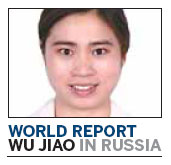Russia's 'historic' Asia tilt
Updated: 2012-09-10 08:03
By Wu Jiao (China Daily)
|
||||||||
When 21 Asia-Pacific leaders and representatives stay in the brand new university campus rooms at the isolated Russky Island in Russia for the annual APEC summit, many of them might be struck by the fast development of Russia's once remote Far East region, and also by Moscow's determination to embrace Asia.

Yet few might expect the meeting signals a crucial juncture in Russia's Asia-tilting policy that will have profound impact on the Asia-Pacific geopolitics, where an eager US is already anxiously expanding its influence.
A politically, economically and culturally European country, Russia's ambition to shift its foreign policy and trade to Asia and the Pacific is evident through its hosting of the APEC summit in Vladivostok, a city that has only 600,000 residents and is located 9,000 km from Moscow.
The port city recently received a facelift, with the construction a new airport, bridges and highway intersections.
The newly constructed Far Eastern Federal University is being used to accommodate VIP attendants and their associates to the summit, and its lecture halls have been a site for discussions on world issues.
"Vladivostok will be the epicenter of business and politics" during the APEC summit, Putin said in an article published on Thursday in the Wall Street Journal. He envisioned Russia's Far East as a link between the markets of Asia and the European Union, which also borders Russia.
The Far Eastern Federal District accounts for 36 percent of the Russia's territory, but generates less than 6 percent of its GDP and has a mere 4.4 percent of the country's population.
The European Union accounts for 50 percent of Russia's foreign trade compared with less than 20 percent for APEC economies.
But APEC, which includes some of the world's largest economies, such as China, the US, Japan and South Korea, certainly offers a big potential market for Russia as the group accounts for almost 55 percent of global GDP, 44 percent of global trade and 40 percent of the world's population.
Some prominent Russian intellectuals have even suggested making Vladivostok the third national capital, in addition to Moscow and Saint Petersburg, and transfering to the city part of the federal government's institutions to facilitate the Asia-tilting policy.
Some analysts said Russia stands at a turning point in its history as momentous as the time of Peter the Great, Russia's emperor who moved the capital from Moscow to Saint Petersburg, which he built on the Baltic Sea in the early 18th century to connect with Europe.
The more resounding Moscow's Asia-Pacific policy becomes, the more it reminds people of the US Asia pivot strategy.
While entangled in a bleak economy and the drawdown of troops in Afghanistan, a tired Washington has re-focused its attention on the Asia-Pacific region, which remains the world's economic engine. It has begun strengthening its military alliance, exploring new partnerships with countries it has neglected for years, and advancing its trade ties with the region.
Figures from the US State Department show that between 2009 and 2011 US exports to APEC economies increased by nearly 45 percent, and they've increased another 7.5 percent in the first half of 2012.
If Russia's tilt in the Asia-Pacific is fully implemented, it will bring in more cooperation from APEC economies.
Yet it will inevitably lead to competition between Moscow and Washington on the economic, political and strategic fronts as both countries aim to hold advantageous positions in the region.
Analysts said some of Washington's Asia-Pacific policy has already raised alarm from Moscow. For instance, the high-profile military alliance formed by the US in the Asia-Pacific region, seen as the Eastern NATO, has already become a compelling concern for Russia.
If Russia proceeds with its Asia-tilt policy, it will lead to large changes in the political landscape of the region.
With Moscow re-engaging with its old rival Washington in the Asia-Pacific region, the Vladivostok APEC meeting will be a high-profile event that will be remembered in the history of the Asia-Pacific.
Contact the writer at wujiao@chinadaily.com.cn
- APEC sets vision for prosperity
- President Hu returns home after APEC meeting
- APEC leaders discuss food security, innovative growth
- Hu urges infrastructure development in APEC
- Regional APEC trade outperforms global deals
- China looking to import more high-tech goods and resources
- Hu: Chinese economy will be 'stable and robust'
- Beijing, Jakarta to work for stability

 Relief reaches isolated village
Relief reaches isolated village
 Rainfall poses new threats to quake-hit region
Rainfall poses new threats to quake-hit region
 Funerals begin for Boston bombing victims
Funerals begin for Boston bombing victims
 Quake takeaway from China's Air Force
Quake takeaway from China's Air Force
 Obama celebrates young inventors at science fair
Obama celebrates young inventors at science fair
 Earth Day marked around the world
Earth Day marked around the world
 Volunteer team helping students find sense of normalcy
Volunteer team helping students find sense of normalcy
 Ethnic groups quick to join rescue efforts
Ethnic groups quick to join rescue efforts
Most Viewed
Editor's Picks

|

|

|

|

|

|
Today's Top News
Health new priority for quake zone
Xi meets US top military officer
Japan's boats driven out of Diaoyu
China mulls online shopping legislation
Bird flu death toll rises to 22
Putin appoints new ambassador to China
Japanese ships blocked from Diaoyu Islands
Inspired by Guan, more Chinese pick up golf
US Weekly

|

|






